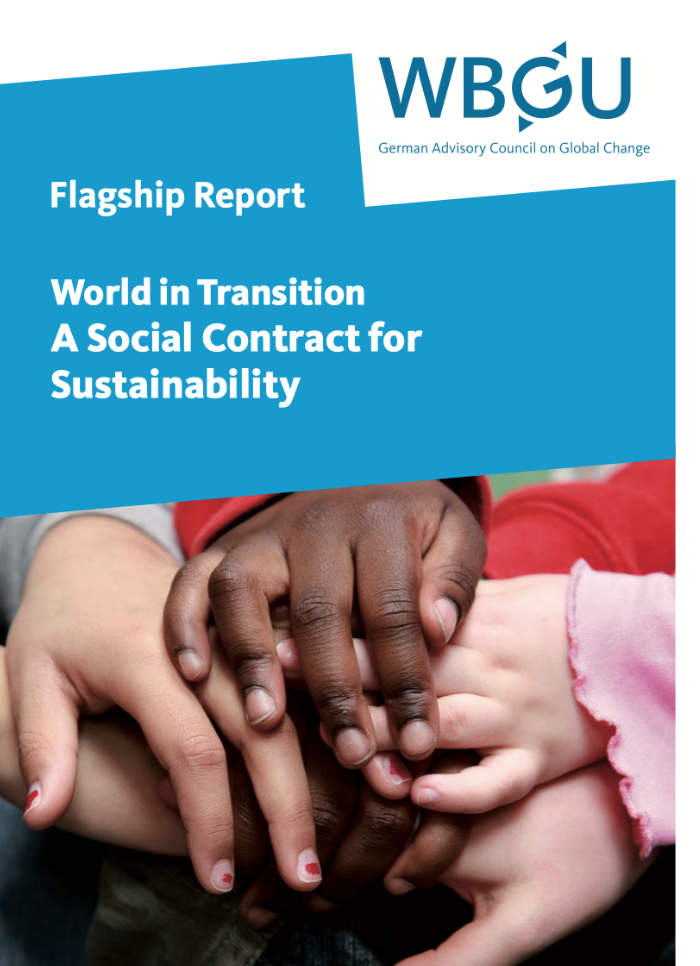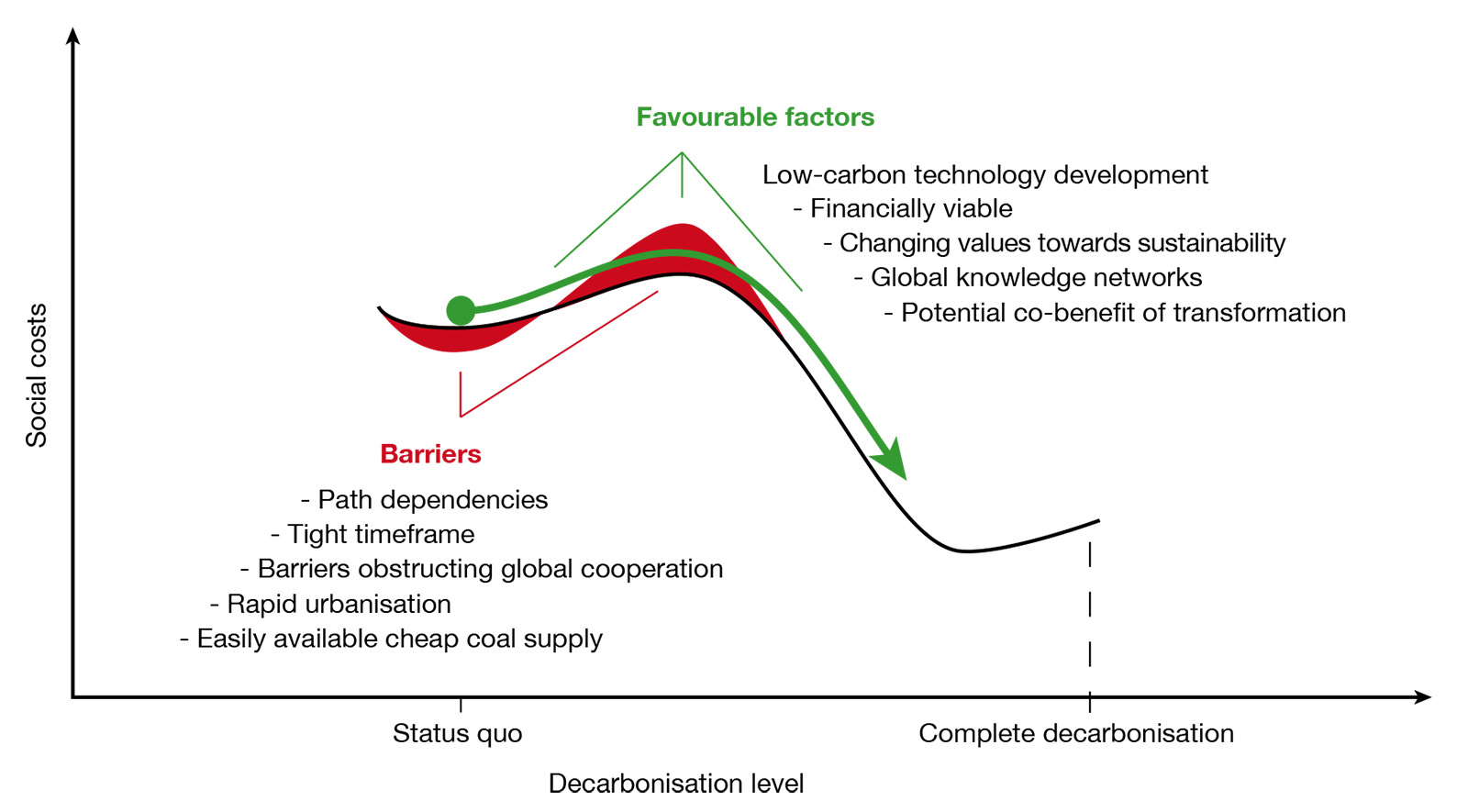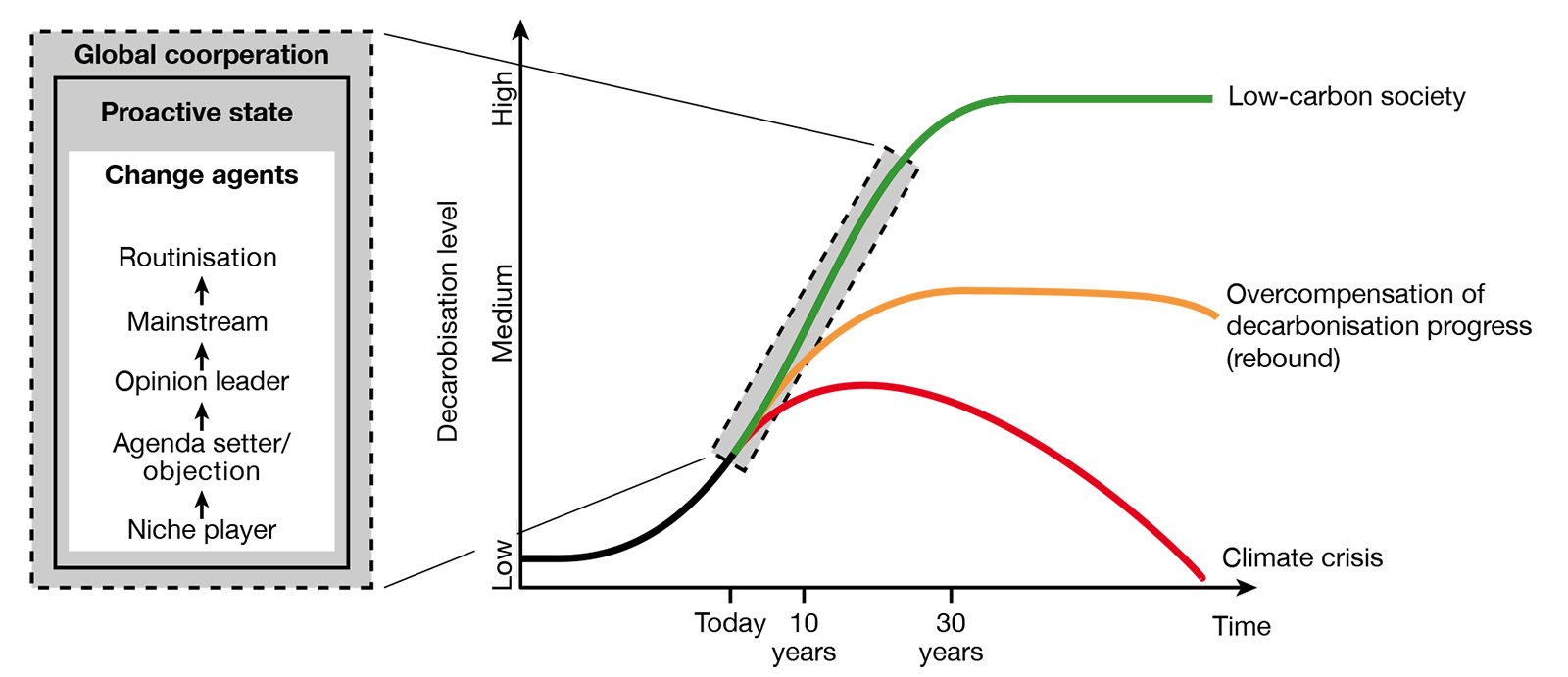
World in Transition – A Social Contract for Sustainability

In this report, the WBGU explains the reasons for the desperate need for a post-fossil economic strategy, yet it also concludes that the transition to sustainability is achievable, and presents ten concrete packages of measures to accelerate the imperative restructuring.
Summary
More about this topic
In the report, “World in Transition A Social Contract for Sustainability” the WBGU explains the reasons for the urgent need for a ‚post fossil-nuclear metabolism‘. It also concludes that the transition to sustainability is achievable, and presents ten concrete packages of measures to accelerate the necessary restructuring. If the transformation really is to succeed, we have to enter into a social contract for innovation, in the form of a new kind of discourse between governments and citizens, both within and beyond the boundaries of the nation state. The modern era‘s global crisis can only be overcome through a profound, shared awareness of low-carbon value creation and sustainable development. In this report, the WBGU elaborates on the prospects of future sustainable economies - which, in view of the Fukushima nuclear disaster, must surely be on the agenda of national and international policy now.

A new Social Contract
The transformation into a sustainable society requires a modern framework to allow the soon-to-be almost nine billion people to lead ‚the good life‘, both in terms of living with each other, and living with nature: a new Contrat Social. A largely virtual social contract such as this is reliant not least upon each individual’s self-concept as a responsible global citizen. This contract is also a contract between generations.
Low-Carbon Challenge
Climate protection plays a particularly important part in the transformation towards sustainability, as it is a conditio sine qua non for sustainable development: although climate protection alone cannot guarantee the conservation of the natural life-support systems on which humanity depends, it is nevertheless foreseeable that without effective climate protection, mankind will soon have to do without some essential development opportunities.
Climate Protection in Three Key Transformation Fields
The transition to climate-friendliness within the scope of sustainable development mainly concerns the following three key supporting pillars of contemporary global society. These pillars should be the starting point for any political agenda.
Firstly, the energy systems, including the transport sector, which the entire economy depends on, and which are currently facing a new wave of growth due to the fast-paced dynamics of the development of the industrialising countries. The energy sector causes around two-thirds of today’s longlived greenhouse gas emissions.
Secondly, the urban areas, currently responsible for three-quarters of global final energy demand, and whose population will double to 6 billion by 2050.
Thirdly, the land-use systems (agriculture and forestry, including deforestation), which are currently responsible for almost a quarter of global greenhouse gas emissions. Land-use does not just have to provide enough food for a world population that continues to grow, and becomes more demanding, but also has to deal with a growth in demand due to the increasing use of bioenergy and bio-based raw materials.

Transformation Concept and Implementation Strategy
The great transformations the human race has so far experienced were, for the most part, the uncontrolled results of evolutionary change. The challenge, unique in history, with regard to the upcoming transformation into a climate-friendly society is advancing a comprehensive change for reasons of understanding, prudence and providence.
The WBGU’s Transformation Strategy
The WBGU views this worldwide remodelling of economy and society towards sustainability as a ‘Great Transformation’. Production, consumption patterns and lifestyles in all of the three key transformation fields must be changed in such a way that global greenhouse gas emissions are reduced to an absolute minimum over the coming decades, and low-carbon societies can develop. The extent of the transformation ahead of us can barely be overestimated. In terms of profound impact, it is comparable to the two fundamental transformations in the world‘s history: the Neolithic Revolution, i. e . the invention and spreading of farming and animal husbandry, and the Industrial Revolution, which Karl Polanyi (1944) called the ‘Great Transformation’, meaning the transition from agricultural to industrialised society.


The Decarbonisation of Energy Systems is Achievable
The most important starting point for the transformation towards sustainability is the reduction of CO₂ emissions from the use of fossil energy carriers. Apart from decarbonisation, a second major goal of a remodelling of the energy systems is overcoming global energy poverty.

Recommendations for Action and Research
Greenhouse gas emissions are primarily caused by the energy industry and land-use, both very much related to rapid global urbanisation. We have thus defined three key fields requiring transformation, where strategies for emissions reduction must show an expeditious and comprehensive effect. In this context, the WBGU elaborates ten packages of measures that are particularly suitable for accelerating and extending the transition to sustainability.
Ten Measure Bundles with Major Strategic Leverage
- The state should show conscious awareness of its enabling and proactive role to advance global decarbonisation. However, this can only be legitimate if it goes hand in hand with offering its citizens far more extensive opportunities for participation.
- The greenhouse gas CO₂ should globally be given an ‘commensurate’ global price as soon as possible.
- A European energy policy aiming for a fully decarbonized energy system by 2050 at the latest should be developed and implemented at once. A direct objective should be the promotion of partnerships with North Africa.
- Feed-in tariffs for renewable energies should be introduced worldwide.
- One top priority for any development policy should be to provide access to sustainable energy to the 2.5 to 3 billion people in developing countries currently living in energy poverty.
- A huge effort should be made to steer the world‘s accelerating urbanisation towards sustainability.
- Land-use can and should become climate-friendly, in particular forestry and agriculture.
- Financing of the transformation and the massive investments required should increasingly rely on new business models that help to overcome current investment barriers.
- Within international climate policy, states should continue to work towards an ambitious global treaty. At the same time, multilateral energy policy must promote the worldwide transfer of low-carbon technologies.
- The United Nations should be brought into a position where they can make effective contributions to the transformation. Development organisations should be reorganised into transformation agencies for sustainable development. The G20 should draft a road map for economic development that takes into account the planetary boundaries.
The Role of the Knowledge Society in the Transformation Process
Research and education are going to play a central role during the requisite transformation process, as the realisation of the necessity for restructuring the world economy has been triggered mainly by scientific knowledge. Society should therefore decide on actions that are not a direct response to recently experienced events, but motivated by foresight and precaution. For this purpose, the debate between science, politics and society should be far more structured, more obligatory, and livelier, to ensure a constructive discourse about the best ways to achieve sustainability. Research and education that assume participation can make a decisive contribution to this.
More on the Subject
Voices to this Report
The new WBGU-Study „A Social Contract for Sustainability” appears at a time in which people around the world are increasingly committed to creating a future that is both sustainable and climate-safe. The study shows that such a future will only be possible if governments, business and civil society collectively set the right course, making the most of regional, national and global cooperation. An important call to cross-cutting integrated action, the book deserves wide recognition.
Christiana Figueres
Executive Secretary of the United Nations Framework Convention on Climate Change (UNFCCC) (2010–2016)
"The geopolitical world is changing beyond recognition. The challenge of ensuring that in the future people can live better than today, while doing so within the Planetary Boundaries has yet to be met. Markets and the environment are increasingly globalized. Social protection and the search for equity are not, though there are interesting signs of change. There are many international institutions, but few are global. We have known for some time the necessary individual solutions required for the transition. Now, the WBGU report `World in Transition – A Social Contract for Sustainability´ offers us extremely interesting ideas on how we can bring all this together collectively through a new social contract that is global, equitable and green, and requires a new kind of global citizenship: the first steps toward a global political project for global sustainability."
Janos Pasztor, Executive Secretary UN Secretary-General's High-level Panel on Global Sustainability 2010-12
PDF Downloads
Deutsch
- Download: Vollversion (PDF 5 MB)
- Download: Zusammenfassung (PDF 400 kB)
English
- Download: Full Version (PDF 5,4 PDF)
- Download: Summary (PDF 340 kB)
中国
- Download: Summary (PDF 3,8 MB)
Commissioned Expert's Studies
External expert studies are comissoned by WBGU, the responsibility for the content rests with the author.
For this Report, the Council has commissioned expert's studies, which are available for download (in German only)
- Download: Prof. Dr. Rolf Peter Sieferle (Universität St. Gallen, Schweiz): „Lehren aus der Vergangenheit für die Transformation zu einer klimafreundlichen Gesellschaft“ (PDF 1.8 MB)
- Download: Prof. Dr. Stephan Leibfried, Prof. Dr. Frank Nullmeier und Prof. Dr. Gerd Winter (Universität Bremen): „Möglichkeiten der globalen Steuerung und globalen beschleunigten Umgestaltung hin zu einer klimaverträglichen Gesellschaft“ (PDF 2.7 MB)
- Download: Ecologic – Gesellschaft für Internationale und Europäische Umweltforschung, Berlin: „Analyse der Konjunkturprogramme zur Bewältigung der Finanz- und Wirtschaftskrise aus Umweltsicht“ (PDF 2.1 MB)

